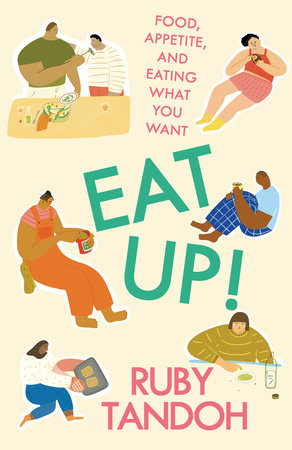2024-05-16
Cooking Blogs and Chocolate Bread
I recently finished Eat Up! by Ruby Tandoh, and am trying to make it a habit to write reviews of books I read! I should add a page on this site with books I've read and links to their respective reviews.
Tandoh is a former The Great British Bake Off contestant, although I didn't know that when I picked up the book. I didn't really know any of the, for lack of a better term, controversy of her career. I want to be clear up front that like, I don't think anything about her precludes me enjoying the book, but also that this isn't explicit stanning of her either. I only know what I've read on wikipedia, and I don't really care to get into the nitty gritty on her treatment on the show, her random Twitter wars with people, etc. I think she seems like a lovely person, and I don't have any reason to dislike her, but I also have that gut reaction that I need to address it whenever I talk about someone with a controversy section on their wikipedia page.
Eat Up! is largely about our relationships with food. I am someone with a decently mixed history with food, and I got what I needed from this book. Through it, Tandoh weaves stories about her life, writings from others, and recipes she's crafted to tell you her philosophy on food. Her writing is evocative, highly sensory, and engaging. Her recipes in the book are written in prose, and walk you through them like a friend standing there with you showing you how to cook it, not telling you. “Add 2 tablespoons of butter, and watch it slide and bubble into molten gold. Peel the garlic cloves (let your fingers take on the smell of the garlic—it is a joy!) and crush them into the hot oil and butter,” she writes in the recipe for tomato soup. Each recipe in the book is guided meditation on the process, or the ingredients, or the dish.
Like Tandoh, I have a history of disordered eating. I have been through a gamut of diagnoses and treatments and have settled into the uphill battle with Avoidant-Restrictive Food Intake Disorder (ARFID). For me, my desire to eat, and desire to eat certain things, is born out of anxiety around food and how it makes me feel. A lot of people think of eating disorders as solely being related to body image, and that's absolutely important and a big chunk of the conversation, but it's not everyone's experience. Autistic people like myself are more likely to suffer from ARFID, as it can result from sensory aversions and neophobia of new foods. For me, I've had a lot of medical issues regarding eating and digestion that has led me to be nervous around what, how much, and when I eat. I've gone a long way through recovery, and this book felt like warm advice that I wish I had a lot earlier in my recovery.
For 2024, I've chosen two things for my new years resolutions: every time I go to a restaurant I have to order something I've never had before (from that restaurant), and I wanted to cook my own meals as often as possible (i.e; less ready to heat and eat meals, more time spent chopping and simmering). I've found through doing this I feel really connected with my food in a way that any amount of talking about my body image with therapists didn't accomplish (though managing my other anxieties outside of my ED did help!!!). Tandoh seems to understand this deeply, as every time she invokes a sense in the book, it's with compassion and a feeling of grounding in the moment, like you're having a spiritual commune with the food.
Tandoh shares my philosophy that “fed is best” (a saying usually heard around the breastfeeding vs formula arguments), meaning that food is neutral. There's no value that a chocolate cupcake has above or below a garden salad. The salad may have more vitamins, more water, and less sugar, but it also produces less dopamine, provides less quickly available energy, and feels less emotionally fulfilling when presented to you with a candle on your birthday. Tandoh gets into some of the nitty gritty regarding food propaganda, and how different industries, different corporations, different social movements have all shaped how we value different foods, and how that's ultimately something that matters little. Tandoh writes of how we fuss over nutritional facts and buzzwords, “Our diets are cut into neat numerical bites, and we put our faith in these numbers with a kind of religious fervor.” She discusses both the colonialism of shunning any food deemed weird and foreign, like cultures that may eat animals that yours doesn't, as well as the exotification that leads people to determine quinoa or acai are the next top healing superfood.
I'm running out of steam and time on this review, but if you want to improve your relationship with food in a comfortable calm way, I do recommend giving this a read!
Tandoh, Ruby. Eat Up!: Food, Appetite and Eating What You Want. Knopf Doubleday Publishing Group. Kindle Edition.
